
Alice O'Connor, better known by her pen name Ayn Rand, was a Russian-born American author and philosopher. She is known for her fiction and for developing a philosophical system she named Objectivism. Born and educated in Russia, she moved to the United States in 1926. After two early novels that were initially unsuccessful and two Broadway plays, Rand achieved fame with her 1943 novel The Fountainhead. In 1957, she published her best-selling work, the novel Atlas Shrugged. Afterward, until her death in 1982, she turned to non-fiction to promote her philosophy, publishing her own periodicals and releasing several collections of essays.
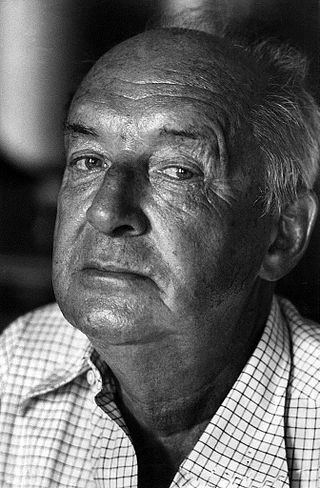
Vladimir Vladimirovich Nabokov, also known by the pen name Vladimir Sirin, was a Russian-American novelist, poet, translator, and entomologist. Born in Imperial Russia in 1899, Nabokov wrote his first nine novels in Russian (1926–1938) while living in Berlin, where he met his wife. He achieved international acclaim and prominence after moving to the United States, where he began writing in English. Nabokov became an American citizen in 1945 and lived mostly on the East Coast before returning to Europe in 1961, where he settled in Montreux, Switzerland.
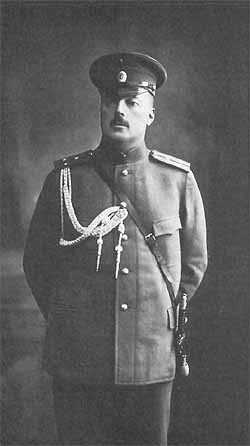
Vladimir Dmitrievich Nabokov was a Russian criminologist, journalist, and progressive statesman during the last years of the Russian Empire. He was the father of Russian-American author Vladimir Nabokov.

Saint Petersburg State University is a public research university in Saint Petersburg, Russia, and one of the oldest and most prestigious universities in Russia. Founded in 1724 by a decree of Peter the Great, the university from the beginning has had a focus on fundamental research in science, engineering and humanities.
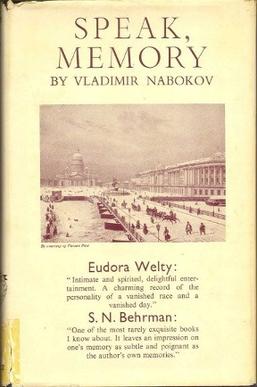
Speak, Memory is a memoir by writer Vladimir Nabokov. The book includes individual essays published between 1936 and 1951 to create the first edition in 1951. Nabokov's revised and extended edition appeared in 1966.

The Hotel Astoria is a historic five-star luxury hotel in Saint Petersburg, Russia, opened in 1912. It has 213 bedrooms, including 52 suites, and is located on Saint Isaac's Square, next to Saint Isaac's Cathedral and across from the historic Imperial German Embassy. The Hotel Astoria, along with its adjoining sister hotel, Angleterre Hotel, is owned and managed by Rocco Forte Hotels. The hotel underwent a complete refurbishment in 2012.

The Palace Embankment or Palace Quay is a street along the Neva River in Central Saint Petersburg which contains the complex of the Hermitage Museum buildings, the Hermitage Theatre, the New Michael Palace, the Saltykov Mansion and the Summer Garden.

The Imperial School of Jurisprudence was, along with the Page Corps, a school for boys in Saint Petersburg, the capital of the Russian Empire.
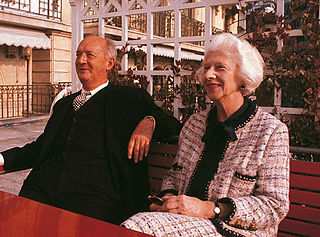
Véra Yevseyevna Nabokova was the wife, editor, and translator of Russian writer Vladimir Nabokov, and a source of inspiration for many of his works.

Saint Petersburg has always been known for its high-quality cultural life, and its best known museum is the Hermitage.
Chichrerin House was a historical landmark building located at Nevsky Prospekt 15 in Saint Petersburg, Russia. It is also known as Kosikovsky House, Elisseeff House and Barrikada cinema theater.

The N. G. Kuznetsov Naval Academy is the main staff college and postgraduate institution for the Russian Navy and is located in Saint Petersburg.

Piotr Dmitrievich Buchkin was a Soviet and Russian painter, watercolorist, graphic artist, illustrator, and art teacher, Honored Arts Worker of the RSFSR. Buchkin lived and worked in Leningrad and was a member and one of the founders of the Leningrad branch of Union of Artists of Russian Federation and representatives of the Leningrad school of painting, most famous for his portrait painting.
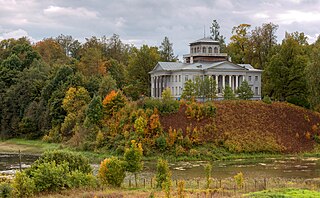
The Rozhdestveno Memorial Estate is a writer's house museum and park near Siverskaya, Gatchinsky District, Leningrad Oblast, that commemorates the most famous owner of the estate, Vladimir Nabokov; the Batovo and Vyra estates, also immortalized by Nabokov, are nearby. As Nabokov spent part of his youth at Vyra, he visited his grandmother at Batovo and his uncle at Rozhdestveno. The Batovo mansion burned down in 1925 and Vyra was destroyed in 1944, leaving Rozhdestveno as the sole survivor of the triad of estates owned by the Nabokov family.
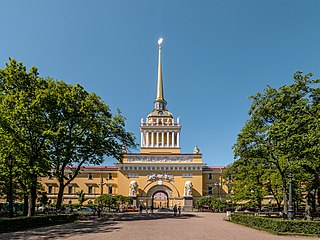
The Admiralty building is the former headquarters of the Admiralty Board and the Imperial Russian Navy in Central St. Petersburg, Russia and the current headquarters of the Russian Navy.
NikolaiYakovlevich Kuznetsov was a Russian and Soviet entomologist, paleoentomologist and physiologist, since 1910 was member of the Russian Entomological Society. Professor Kuznetsov was very important as a pioneer in the fields of insect physiology, Lepidoptera fauna of the Arctic (Siberia) and knowledge of fossils of Lepidoptera.
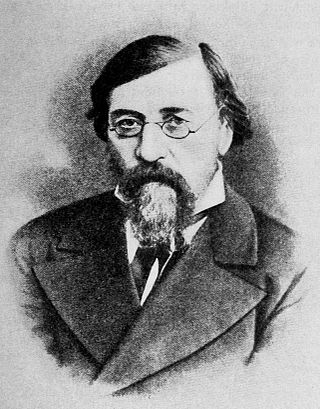
Nikolay Gavrilovich Chernyshevsky was a Russian literary and social critic, journalist, novelist, democrat, and socialist philosopher, often identified as a utopian socialist and leading theoretician of Russian nihilism and Narodniks. He was the dominant intellectual figure of the 1860s revolutionary democratic movement in Russia, despite spending much of his later life in exile to Siberia, and was later highly praised by Karl Marx, Georgi Plekhanov, and Vladimir Lenin.
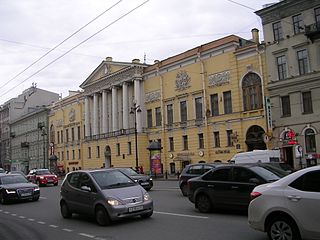
Nevsky Prospect 86 is a neoclassical palace situated on the Nevsky Prospect in St Petersburg, Russia. It is also known as the Palace of Arts or the Palace of Zinaida Yusupova.

Sergey Vladimirovich Nabokov was a Russian poet and pedagogue. He died in a Nazi concentration camp located in Neuengamme. He was brother to Vladimir Nabokov.

Count Sergey Dmitrievich Sheremetev was a Russian public figure, historian, collector. A rich landowner, he owned the Kuskovo, Mikhailovskoye, Vvedenskoye and Ostafyevo estates in Moscow Governorate and the Fountain House Saint Petersburg Oberjägermeister since 1904, he held the Active State Councillor rank. The Sheremetyevskaya railway station was named after him, after which in turn the Sheremetyevo Airport was later named.

























